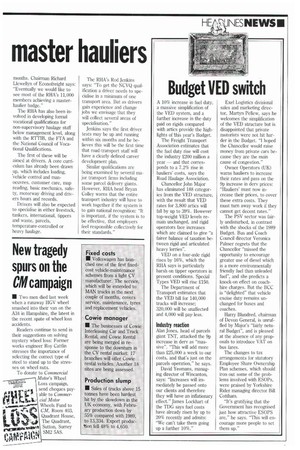Budget VED switch
Page 7

If you've noticed an error in this article please click here to report it so we can fix it.
A 10% increase in fuel duty, a massive simplification of the VED system, and a further increase in the duty paid on rigids compared with artics provide the highlights of this year's Budget. The Freight Transport Association estimates that the fuel duty rise will cost the industry £200 million a
year and that corresponds to a 7.2% rise in hauliers' costs, says the Road Haulage Association.
Chancellor John Major has eliminated 188 categories from the VED structure, with the result that VED rates for 3,800 artics will fall by up to 39%. However top-weight VED levels remain unchanged, and rigid operators face increases which are claimed to give "a fairer balance of taxation between rigid and articulated heavy lorries".
VED on a four-axle rigid rises by 16%, which the RIIA says is particularly harsh on tipper operators in present conditions. Special Types WI/ will rise £150.
The Department of Transport estimates that the VED bill for 140,000 trucks will increase; 320,000 will be unaffected and 4,000 will pay. less.
Industry reaction Alan Jones, head of parcels giant TNT, attacked the 9p increase in dery as "massive". "This will add more than .U5,000 a week to our costs, and that's just on the parcels operation," he says. David Yeomans, managing director of Wincanton, says: "Increases will immediately be passed onto our clients and therefore they will have an inflationary effect." James Lockhart of the TDG says fuel costs have already risen by up to 20% recently and admits: "We can't take them going up a further 10%."
Exel Logistics divisional sales and marketing director, Martyn Pellew, says he welcomes the simplification of the VED structure but is disappointed that private motorists were not hit harder in the Budget. "I hoped the Chancellor would raise money from private cars because they are the main cause of congestion."
Owner Operators (UK) warns hauliers to increase their rates and pass on the 9p increase in dery prices: "Hauliers' must now increase their prices, to cover these extra costs. They must turn away work if they cannot get decent rates." The PSV sector was fairly undisturbed, in contrast with the shocks of the 1989 Budget. Bus and Coach Council director Veronica Palmer regrets that the Chancellor "missed the opportunity to encourage greater use of diesel which is a more environmentally friendly fuel than unleaded fuel", and she predicts a knock-on effect on coachhire charges. But the BCC is "delighted" that vehicle excise duty remains unchanged for buses and coaches.
Harry Blundred, chairman of Devon General, is unruffled by Major's "fairly netural Budget", and is pleased at the absence of any proposals to introduce VAT on bus fares.
The changes to tax arrangements for statutory Employee Share Ownership Plan schemes, which should iron out some of the problems involved with ESOPs, were praised by Yorkshire Rider managing director Bill Cottham.
"It's gratifying that the Government has recognised just how attractive ESOPS are," he says. "This will encourage more people to set them up."








































































































